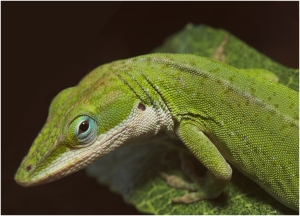A Lizard in the Story§
by Russell Dyer
published: may 10, 2006; revised: may 10, 2006; readers in past month: 97

The idea of my novel began based on a humorous moment between my friend Richard Stringer, his wife, and me one night at their home. Richard was asking me about a virus he thought he had on his computer. In response, his wife said that he didn’t have a virus, he just thinks he does whenever his computer is sluggish. I laughed and said, “He’s a digital hypochondrial.” and said, “Hey, they could make for a funny story.”
I used this inspiration to write a 2000-word story (or rather a character description of Richard) for a creative writing class I was taking at Southeastern Louisiana University in November 2003. It was well received by the class. Under the encouragement of the teacher and many others, I added a few thousand more words to the text to create a short story I called A Digital Hypochondriac. This led to my writing a few more short stories involving the main character, Oliver. I thought to try to publish them as a series of stories in a magazine, but was unsuccessful at selling the idea. My editor for my technical books (Andy Oram) suggested that I find an underlying plot to connect these short stories together. He suggested using the plot and ending of the first story as it had interesting intrigue in it. I took his suggestions and began my novel, In Search of Kafka.
Over the past couple of years or so, I have worked on my novel, like many would-be fiction writers, as a pet project, a dream that never comes about. In time I accumulated about sixty pages of text that was a bit limp, although comical. I couldn’t go any further, other than to continue to hone what I had already written. I wasn’t sure what was the impass: I thought it might have been that I have been busy with many other writing projects, learning Italian and living in a new country, deplacement feelings over the hurricane, and depression over losing one of my best friends, Richard Stringer. I think these factors certainly played a part in my stalling. However, about a month ago I had a break through.
First, I decided to attack the book with determination to complete it. So I started pushing further into the story, looking for a more interesting angel for the second half — I had roughed out the first six chapters and had a weak outline for the remaining nine, but felt the story was getting limper with each chapter. The main character, Oliver, is a nice guy who people tend to walk over. This is an autobiographical characteristic — or at least it was up until the past year or so. I’ve become a person who knows what he wants in life, is fine with himself and not cowering to others any more. As a result, I was having difficulty perpetuating Oliver’s docile and unhappy ways for another hundred plus pages. I couldn’t get myself to do it.
Basically, I’ve changed, but Oliver hadn’t in the interim — I no longer identified with Oliver. My editor had told me, when he had given me his assessment that started me on the novel path, that the main character should grow during the course of the book. Along these lines, unexpectedly, while writing a scene in which Oliver is considering his problem (i.e., being hunted by government agents unfairly), something minor occurs which triggers him into changing: he’s sitting in a coffee shop working on his computer, not paying attention to what’s occuring in the shop, when he overhears the conversation of two of the baristas. They’re talking about how two Homeland Security agents were just in the coffee shop. Oliver inquires about them and realizes that the agents aren’t going to stop hunting for him. He’s now at the end of the path of denial, but faced with a few new paths to take: worry, surrender, or fighting. As he’s pondering his delema, he seems prone to surrender when a lizard comes running across the floor and shakes him free of his trance, his fixation on the path of defeat. When he resumes his thinking, he decides that he must fight back. Oliver changed his attitude of hoping his problems would be solved and living in denial, to a person who takes action to solve his problems. Oliver changed. He has become more like the new me. The result is that I have written another ninty pages of text in the past month. While the first forty-percent of the novel is humorous, the rest of the novel is more intriguing, more like a detective novel than a clown story. I now have a clear vision and plan for the remainder of the novel. Now I can finish my first novel and will do so in the next few weeks.